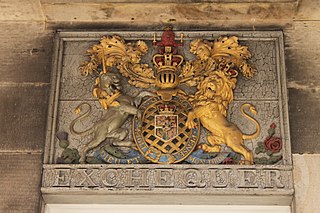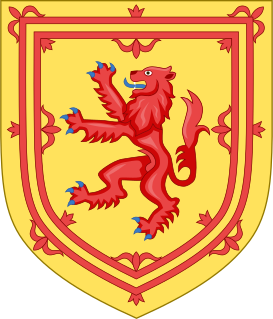 W
WThe Scottish Exchequer had a similar role of auditing and deciding on Royal revenues as in England. It was not until 1584 that it also became a court of law, separate from the King's Privy Council. Even then, the judicial and administrative roles never became completely separated into two bodies, as with the English Exchequer. The Auditor of the Exchequer played a pivotal role in this important office of state.
 W
WThe Cabinet Secretary for Finance and the Economy, commonly referred to as the Finance Secretary, is a member of the Cabinet in the Scottish Government. The Cabinet Secretary has Ministerial responsibility for the Scottish Government's Finance Directorates.
 W
WThe Cabinet Secretary for Infrastructure, Investment and Cities was a position in the Scottish Government Cabinet. The Cabinet Secretary had responsibilities for infrastructure, procurement, transport, European Structural Funds, Scottish Water and cities. The Cabinet Secretary was assisted by the Minister for Transport and Islands.
 W
WThe Commission on Scottish Devolution, also referred to as the Calman Commission or the Scottish Parliament Commission or Review, was established by an opposition Labour Party motion passed by the Scottish Parliament on 6 December 2007, with the support of the Conservatives and Liberal Democrats. The governing Scottish National Party opposed the creation of the commission.
 W
WThe Court of Exchequer was formerly a distinct part of the court system of Scotland, with responsibility for administration of government revenue and jurisdiction of adjudicate on cases relating to customs and excise, revenue, stamp duty and probate. In 1856 the Court of Session was designated as the Exchequer Court, which now carries out its judicial functions.
 W
WThe Scottish Government Finance Directorates are a group of civil service Directorates in the Scottish Government created by a December 2010 re-organisation.
 W
WFull fiscal autonomy (FFA) – also known as devolution max, devo-max, or fiscal federalism – is a particular form of far-reaching devolution proposed for Scotland. The term has come to describe a constitutional arrangement in which instead of receiving a block grant from the UK Exchequer as at present, the Scottish Parliament would receive all taxation levied in Scotland; it would be responsible for most spending in Scotland but make payments to the UK government to cover Scotland's share of the cost of providing certain UK-wide services, including at least defence and the conduct of foreign relations. Scottish fiscal autonomy – stopping short of full political independence – is usually promoted by advocates of a federal constitution for the United Kingdom.
 W
WThe Minister for Just Transition, Employment and Fair Work is a junior ministerial post in the Scottish Government that was created in May 2021.As a result, the minister does not attend the Scottish Cabinet, but supports the Cabinet Secretary for Finance and the Economy and Cabinet Secretary for Net Zero, Energy and Transport, who both attend the cabinet.
 W
WThe Minister for Public Finance, Planning and Community Wealth is a Junior ministerial post in the Scottish Government. As a result, the Minister does not attend the Scottish Cabinet. The post was created in June 2018: the Minister supports the Cabinet Secretary for Finance, who is a full member of cabinet.
 W
WMembers of the Scottish Parliament (MSPs) are entitled to a salary, and where applicable, expenses and allowances.
 W
WThe Police and Fire Services (Finance)(Scotland) Act 2001 is an Act of the Scottish Parliament. It was passed by the Parliament on 1 November 2001 and received Royal Assent on 5 December 2001. It was repealed upon the enactment of the Police and Fire Reform (Scotland) Act 2012, which merged Scotland's territorial police and fire services into national bodies, Police Scotland and the Scottish Fire and Rescue Service.
 W
WScottish Parliament committees are small groups of Members of the Scottish Parliament (MSPs) who meet on a regular basis to scrutinise the work of the Scottish Government, conduct inquiries into subjects within their remit and examine legislation. Much of the everyday work of the Scottish Parliament is done by these committees.
 W
WThe Scotland Act 2012 is an Act of the Parliament of the United Kingdom. It sets out amendments to the Scotland Act 1998, with the aim of devolving further powers to Scotland in accordance with the recommendations of the Calman Commission. It received Royal Assent in 2012.
 W
WThe Scotland Act 2016 is an act of the Parliament of the United Kingdom. It sets out amendments to the Scotland Act 1998 and devolves further powers to Scotland. The legislation is based on recommendations given by the report of the Smith Commission, which was established on 19 September 2014 in the wake of the Scottish independence referendum.
 W
WThe Scottish Futures Trust (SFT) is an executive non-departmental public body of the Scottish Government, established in September 2008 to improve public infrastructure investment. SFT operates at arm's length from the Government but works closely with the public and private sectors to deliver value-for-money on all public sector infrastructure investment across the country. The trust has the aim of saving £100–£150 million each year through a wide range of activities.
 W
WThe Scottish Government Finance and Corporate Services Directorates were a set of directorates of the Scottish Government. They were responsible for delivering ministerial support, human resources, legal services and procurement to the other directorates. In December 2010 these functions were taken on by the Governance and Communities Directorate and the Finance Directorate.